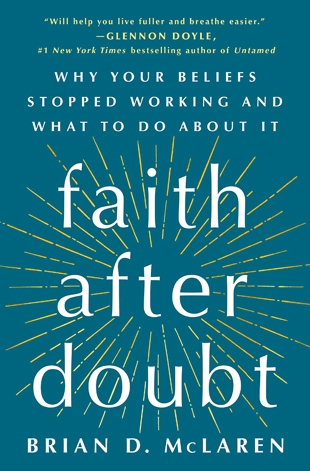"I promise you: there is faith after doubt, and life after doubt, and life with doubt," writes this former college teacher who was also a pastor for 24 years. "If you thought life before doubt was good, wait until you see where doubt can lead you and what doubt can teach you." McLaren is an author, activist, public theologian, and frequent guest lecturer for gatherings in the United States and internationally. The author of more than 15 books, he is a faculty member of the Living School at the Center for Action and Contemplation. He is profiled in S&P's Living Spiritual Teachers Project.
McLaren has written this cogent and relevant book for the 65 million American adults who have dropped out of active church attendance and the 2.7 million more who are leaving every year. It's a timely release since a recent Gallup poll indicated that for the first time in history, less than 50% of the U.S. adults belonged to a church, synagogue, or mosque.
Could doubt be driving this trend? Standing beside Christian theologian Paul Tillich, McLaren writes:
"Doubt isn't the opposite of faith; it is an element of faith. . . . Sometimes I think it is my mission to bring faith to the faithless, and doubt to the faithful."
The author has organized this practical book into three parts: In "Your Descent into Doubt," he notes how doubt accompanies loss, loneliness, and crisis but can also be a doorway. In Part Two, "All in Doubt," he probes doubt not just as a deterioration process but as a growth process that provides you with opportunities to mature intellectually, spiritually, morally, and relationally. And in Part Three, "Life After (And With) Doubt, he turns to the future, exploring how to live with doubt as a companion rather than an enemy on the journey of faith. We were edified by the questions, exercises, and practical guidelines for "Reflection and Action" designed to help us engage more deeply with the material in each chapter.
One of the changes we've noted in our recommendations of spiritual books is that we are discovering that the appendices at the end often contain the most visionary material in these transformative resources. So it is in Faith After Doubt. In Appendix IV, McLaren presents "Resources for Doubters," noting: "What the Wittenberg door and the newly invented printing press were to the audacious doubters of the Protestant Reformation, podcasts, websites, books, and events are to the 'great emergence' happening today." McLaren then presents a list of authors who are helping people navigate toward faith after doubt. You will recognize many of these from the pages of Spirituality & Practice (with their books easily findable through our reviews search engine). Here's a partial list:
Diana Butler Bass, Richard Rohr, Rob Bell, John Dominic Crossan, Cynthia Bourgeault, Thomas Merton, Barbara Brown Taylor, Walter Brueggemann, Howard Thurman, Marcus Borg, John Shelby Spong, Joan Chitister, and Frederick Buechner
He covers a lot of territory with a values-oriented assessment of the Four Stages of Faith: simplicity, complexity, perplexity, and harmony. The resource stream keeps flowing with more links, recent books for doubters, and guidelines for groups and classes.
Faith After Doubt is a bold, progressive, and spiritually rich vision of these two life experiences.
